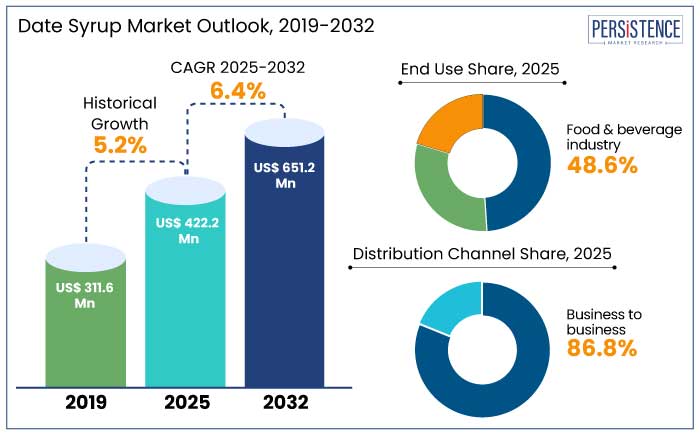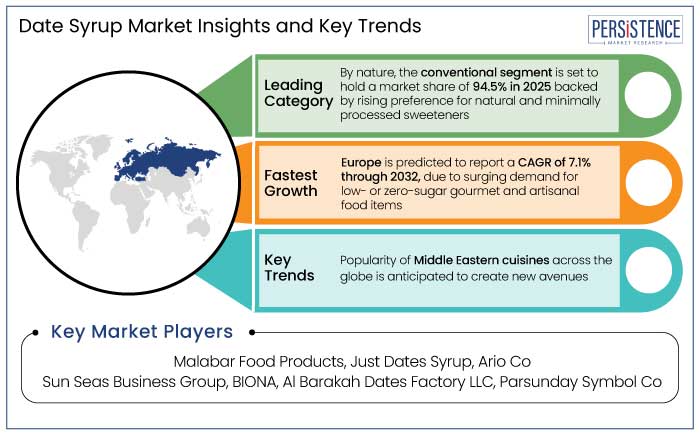Industry: Food and Beverages
Published Date: January-2025
Format: PPT*, PDF, EXCEL
Delivery Timelines: Contact Sales
Number of Pages: 184
Report ID: PMRREP32624
The global date syrup market is estimated to reach a size of US$ 422.2 Mn in 2025. It is predicted to rise at a CAGR of 6.4% through the assessment period to attain a value of US$ 651.2 Mn by 2032.
Demand for date syrup is surging, particularly in the Middle East, Africa, and South Asia, driven by its increasing use in the nutraceutical and foodservice industries. Heart disease, diabetes, and other ailments can be effectively managed with date syrup, a low-glycemic natural sweetener that is a healthier substitute for regular sugar.
According to studies, demand for natural sweeteners grew by 15.2% in 2023, reflecting consumers’ increasing preference for products free from artificial additives. In October 2023, Al Foah, a leading UAE-based date producer, introduced its premium organic date syrup line, targeting global nutraceutical markets.
In November 2023, NutraHerbs, a South Asia-based brand, launched a fitness-focused date syrup enriched with added electrolytes for athletes. As a sustainable and health-conscious sweetener, date syrup is becoming ever more common worldwide because of its several uses and nutritional advantages.

Key Highlights of the Market
|
Market Attributes |
Key Insights |
|
Date Syrup Market Size (2025E) |
US$ 422.2 Mn |
|
Projected Market Value (2032F) |
US$ 651.2 Mn |
|
Global Market Growth Rate (CAGR 2025 to 2032) |
6.4% |
|
Historical Market Growth Rate (CAGR 2019 to 2023) |
5.2% |
North America is projected to hold 28.5% of the global market share in 2025. The region is estimated to report a CAGR of 6.7% from 2025 to 2032, driven by rising demand for organic and natural products.
Consumers in the U.S., which accounted for 80% of North America in 2023, are seeking clean-label, non-GMO, and sustainable sweeteners, fueling demand for organic date syrup. According to studies, sales of natural sweeteners in North America grew by 11% in 2023, reflecting consumer awareness of health and environmental concerns. For example,
Demand for gourmet and artisanal food items is projected to propel Europe's date syrup industry to overtake the worldwide market by 31.2% in 2025, with a predicted CAGR of 7.1% from 2025 to 2032. The retail market for organic sweeteners rose by 10% in 2023 owing to consumers' interest in date syrup because of its clean-label appeal, adaptability, and better substitute for refined sugar. For instance,
Europe is a crucial market for the growth of date syrup because of these tendencies as well as cultural curiosity.
The Business-to-Business (B2B) segment is projected to dominate the global market in 2025, holding an 86.8% market share. Growth is driven by its extensive use in the foodservice, nutraceutical, and beverage industries.
Sales of natural sweeteners grew by 14% in 2023 because of the desire for natural ingredients in processed meals and beverages. The rise was mostly caused by restaurants, bakers, and producers of health products buying in bulk. For example,
As the trend toward healthier, natural products continues, the B2B channel remains the backbone of the date syrup market's growth.
Conventional date syrup is set to hold 94.5% of the market share in 2025, driven by its affordability, widespread availability, and rising preference for natural and minimally processed sweeteners. Date syrup emerged as a popular option because of its antioxidants, vitamins, and minerals, which matched the rising demand for organic products. In 2023, worldwide sales for natural sweeteners expanded by 12%.
As health-conscious consumers prioritize natural products, conventional date syrup continues to drive the market globally.
The clean-label, plant-based food movement, growing popularity of veganism and health consciousness, and rising need for natural sweeteners have led to the use of date syrup. Products made from dates are becoming more widely accepted in Asia and Western countries due to the globalization of Middle Eastern cuisine. Owing to customer preference for superior, chemical-free products, premium, and organic date syrup are becoming immensely popular.
Sports, fitness, and professional chefs are using date syrup's natural energy-boosting properties in their recipes, which is fueling the industry's growth due to its lower glycemic index and diabetic worries. Concerns about environmental sustainability favor the manufacturing of date syrup over traditional ways of processing sweeteners.

The global date syrup market recorded a CAGR of 5.2% in the historical period from 2019 to 2023. In an effort to increase their market share, date syrup producers are extending their facilities and product development plans. For instance,
To increase their market presence, several businesses are taking advantage of shifting lifestyles and economies. Demand for products featuring date syrup is estimated to record a considerable CAGR of 6.4% during the forecast period between 2025 and 2032.
Rising Popularity of Middle Eastern Cuisines
Date syrup is widely used in cooking, baking, and beverages due to its rich flavor, nutritional benefits, and clean-label appeal. The popularity of Middle Eastern dishes such as baklava and tahini-based desserts has introduced date syrup to international markets.
The globalization of Middle Eastern cuisine is driving demand for natural sweeteners in the food and beverage industry, which is projected to hold 48.6% of the market share in 2025. According to studies, the global Middle Eastern food market grew by 14% in 2023, reflecting rising consumer interest in exotic culinary experiences.
Surging Diabetes Cases across the Globe
Increasing prevalence of diabetes highlights the need for better sugar substitutes. Date syrup is becoming immensely popular due to its lower glycemic index, making it a healthy, diabetic-friendly choice packed with fiber, antioxidants, and essential minerals.
Companies like D’vash Organics and Al Foah are capitalizing on this trend by launching innovative date syrup products. For example,
Such developments highlight date syrup’s role in addressing health-conscious and diabetic consumer needs while driving market growth.
Presence of Other Substitutes Limits Sales of Date Syrup
Consumers are increasingly seeking natural and healthy alternatives to sugar due to health concerns and the high calories in regular sugar. Date syrup is the ideal substitute, but its affordability is a concern. The popularity of other substitutes like honey, molasses, maple syrup, and agave hinder market growth.
Use of primitive farming techniques by farmers is a restraint on market growth. Demand for date-based products is increasing, but current farming and cultivation practices are primitive too. There is a need for innovation in date palm farming and cultivation to meet the high demand. The price of a product plays a significant role in market growth.
Sustainable Practices in Production to Present Novel Prospects
Concerns about environmental sustainability are pushing the manufacturing of date syrup away from traditional, resource-intensive sweetener manufacturing techniques. Unlike other sweeteners like cane sugar and corn syrup, which need a lot of water, pesticides, and significant amounts of agricultural areas, date syrup is produced with little harm to the environment.
Dates, on the other hand, are a more sustainable choice as these are cultivated in desert areas and need less water. Companies like D’vash Organics and Date Lady are leading this change by promoting their syrups as organic, water-efficient alternatives to conventional sweeteners.
Sports Nutrition Industry Propels Demand for Plant-based Supplements
Date syrup's natural energy-boosting qualities and excellent nutritional profile make it a popular choice for athletes and fitness enthusiasts looking for a clean energy source that doesn't include processed sugars. The global sports nutrition market is seeing a shift toward more natural, plant-based ingredients, with date syrup emerging as a key product.
Companies like D’vash Organics have capitalized on this trend, launching their date syrup as an energy booster for pre-and post-workout recovery. For example,
Companies that make date syrup are concentrating on building new facilities and developing new products to increase their market share. In a variety of industries, such as food, drinks, nutraceuticals, cosmetics, and personal care, they provide a range of certifications and goods.
Supply chain management is their top priority, and they strategically locate facilities in modern industrial locations to guarantee steady supply and cost reduction. To satisfy demand, they also boost manufacturing capacity.
Businesses in the global market attract new clients in the foodservice and food and beverage industries by offering products in various quality grades. Date syrup producers may also accommodate their consumers’ preferences by meeting changing demands.
Recent Industry Developments
|
Attributes |
Details |
|
Forecast Period |
2025 to 2032 |
|
Historical Data Available for |
2019 to 2023 |
|
Market Analysis |
US$ Million for Value |
|
Key Regions Covered |
|
|
Key Market Segments Covered |
|
|
Key Companies Profiled in the Report |
|
|
Report Coverage |
|
|
Customization and Pricing |
Available upon request |
By Nature
By End Use
By Distribution Channel
By Region
To know more about delivery timeline for this report Contact Sales

The market size is set to reach US$ 651.2 Mn by 2032.
Date syrup, with its higher potassium, calcium, and magnesium levels than maple syrup or honey, contains up to 10 times more antioxidants.
In 2025, North America is set to attain a market share of 28.5%.
In 2025, the market is estimated to be valued at US$ 422.2 Mn.
Malabar Food Products, Just Dates Syrup, Ario Co, Sun Seas Business Group, and BIONA are a few key players.